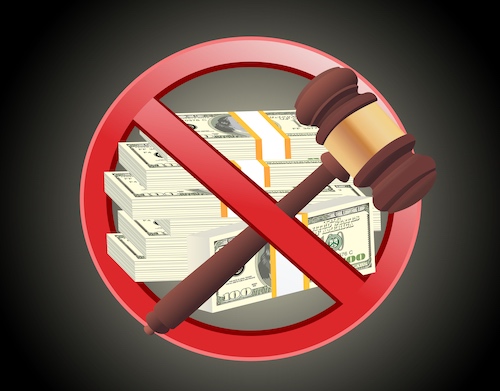“The only meaningful remedy is vacatur of the relevant decisions and reconsideration by a newly constituted impartial PTAB panel free of financial conflicts.”
 One day after U.S. Patent and Trademark Office (USPTO) Director Kathi Vidal testified during a hearing before the House Judiciary Subcommittee on Courts, Intellectual Property and the Internet, Centripetal Networks filed a reply in support of its petition for a writ of mandamus in its patent dispute with Cisco.
One day after U.S. Patent and Trademark Office (USPTO) Director Kathi Vidal testified during a hearing before the House Judiciary Subcommittee on Courts, Intellectual Property and the Internet, Centripetal Networks filed a reply in support of its petition for a writ of mandamus in its patent dispute with Cisco.
Additionally, Centripetal’s counsel at Dowd Scheffel PLLC sent a letter to the U.S. Court of Appeals for the Federal Circuit (CAFC) on Monday drawing the court’s attention to Director Vidal’s testimony before the House IP subcommittee, which they argued is a further reason to grant Centripetal its mandamus petition.
Financial Conflict of Interest
The current disagreement between the USPTO and Centripetal has its origin in the CAFC’s decision last June to reverse the $2.75 billion damages award to Centripetal after ruling that the district court judge should have disqualified himself over his wife’s financial interest in Cisco, the defendant in the infringement action. The wife of the district judge in the case owned $4,687.99 in Cisco stock, which was discovered after the bench trial on infringement was conducted and the judge had already drafted the final ruling.
The stock interest was subsequently put in a blind trust, but the CAFC ruled that 28 U.S.C. § 455(f) required complete divesture of the stock. Thus, the multibillion-dollar ruling was vacated and remanded for another trial.
Then, in parallel inter partes review (IPR) proceedings brought by Cisco at the Patent Trial and Appeal Board (PTAB) challenging the validity of Centripetal’s patent claims, Centripetal discovered that Administrative Patent Judge (APJ) Brian McNamara has a stock interest of up to $15,000 in Cisco and receives an annual profit share from law firm Foley & Lardner, which represents Cisco in lobbying efforts.
McNamara withdrew from the IPR proceeding after he voted to institute the challenge to Centripetal’s patent claims. The USPTO argued the withdrawal “moot[ed] any concern about perceived bias.”
“That argument should terrify any PTAB participant,” wrote Centripetal in its April 28 filing.
Centripetal’s resulting motion for recusal and vacatur was deemed “frivolous [and] baseless” by the PTAB. The Board also threatened Centripetal with sanctions if it made “further baseless arguments directed at the Board, its members, or its process.”
In its most recent filing, Centripetal characterized the PTAB’s threat of sanctions as “the ultimate chilling effect on the public.”
Should Article III Judges and APJs Be Held to Similar Recusal Standards?
“Patent owners and patent challengers alike expect the same professionalism and impartiality, whether in district court or the PTAB,” wrote Centripetal in its latest filing.
The USPTO has previously argued that there are different ethical rules for executive branch employees and federal judges. While Section 455 requires federal judges to recuse themselves from cases when impartiality might be reasonably questioned, executive branch employees are required to recuse under 5 CFR § 2635.402 only if the matter in which the employee is involved will have a “direct and predictable effect on that interest.”
Centripetal took issue with this in its mandamus petition and has argued that Vidal’s recent testimony contradicts previous USPTO statements on this matter.
“According to the PTO, the Board panel could own millions of dollars of Cisco stock, open the door to invalidation of a patent Cisco infringes, and simply recuse the next day, mooting any conflict,” wrote Centripetal.
In front of the House IP Subcommittee, Director Vidal said, “when I perform that role [i.e., Director review], I hold myself to the same standard of any Article III judge.”
Centripetal’s counsel highlighted this statement in its letter to the CAFC and argued, “the Director’s representation to a coordinate branch is wholly inconsistent with the [US]PTO’s position here that the ethical considerations at play in proceedings before APJs are “just different” from the standards for Article III courts.”
Additionally, they argued that Vidal’s statement that she applies the “same standard of any Article III judge” is consistent with Centripetal’s position on the matter. They continued that if Director Vidal applied the standards of an Article III judge then APJs should also be held to the same standard, including on recusal due to financial interests.
“The same standards should uniformly apply to the PTAB,” wrote Centripetal’s counsel.
Further Concerns
In addition to Vidal’s latest statements, Centripetal’s petition cites other concerns as support for its mandamus petition. The patent owner argued faltering public trust and the Board’s continuing conflict as reasons to grant the petition.
The petitioner argued that patent proceedings need increased impartiality in part due to low public confidence in government institutions. “Public confidence has reached a nadir, as shown by recent reports revealing irregularities and a lack of transparency,” wrote Centripetal.
Furthermore, the petitioner made the case that “the entire process’s impartiality is now compromised” because its right to a neutral and detached judge was violated.
“The only meaningful remedy is vacatur of the relevant decisions and reconsideration by a newly constituted impartial PTAB panel free of financial conflicts,” wrote Centripetal.
Image Source: Deposit Photos
Image ID: 38611709
Author: mitay20

![[IPWatchdog Logo]](https://ipwatchdog.com/wp-content/themes/IPWatchdog%20-%202023/assets/images/temp/logo-small@2x.png)

![[Advertisement]](https://ipwatchdog.com/wp-content/uploads/2024/04/Patent-Litigation-Masters-2024-sidebar-700x500-1.jpg)

![[Advertisement]](https://ipwatchdog.com/wp-content/uploads/2021/12/WEBINAR-336-x-280-px.png)
![[Advertisement]](https://ipwatchdog.com/wp-content/uploads/2021/12/2021-Patent-Practice-on-Demand-recorded-Feb-2021-336-x-280.jpg)
![[Advertisement]](https://ipwatchdog.com/wp-content/uploads/2021/12/Ad-4-The-Invent-Patent-System™.png)






Join the Discussion
7 comments so far.
Anon
May 4, 2023 10:06 pmOk, I will put this on the table (again).
The institution is in effect a legislative taking.
Choices in action and such legal niceties are viewed as types of property. The status of a granted patent having need for a Clear and Convincing standard to turn a granted patent to a deemed “not valid” patent is such a stick in the bundle of property rights. See i4i.
At institution (prior to ANY ‘official’ adjudication), that stick in the bundle is removed.
With zero payment for that removal.
David Lewis
May 4, 2023 06:10 pmIt seems to me that by participating in the decision to institute, McNamara has not just tainted the IPR process, but from the point of view of the parent holder, McNamara participated in the most significant part of the process, while compromised. The patent holder likely has the highest chance of keeping their patent unscathed, by having institution denied. Once the IPR is instituted, it has already been decided that the petitioner has a higher probability of winning than losing, and so the IPR is inherently skewed against the applicant.
Josh Malone
May 3, 2023 11:39 pmThe future of the PTAB is looking less certain day after scandalous day.
PatentPro
May 3, 2023 08:00 pmTo Judy: That only makes sense if you ignore that fact that Palo Alto Networks had not reason to IPR this patent.
Judy
May 3, 2023 05:57 pmI’m no expert, but the description above seems very misleading. On the USPTO website Palo Alto Networks requested the IPR, and Cisco asked to join after it was already instituted. That’s a very different story.
Julie Burke
May 3, 2023 04:19 pm“Briefly stated, the impartiality rule REQUIRES an employee to consider appearance concerns BEFORE participating in a particular matter if someone close to the employee is involved as a party to that matter. This requirement to refrain from participating (or “recuse”) is designed to avoid the appearance of favoritism in governmental decision-making.” [emphasis added].
U.S. Office of Government Ethics’ article entitled “A Refresher on the Impartiality Rule” dated January 25, 2017.
Ethics questions about/by USPTO employees can be sent to the OGE experts at [email protected]
Alan
May 3, 2023 03:21 pmHow can withdrawing after an institution decision is made moot the issue? McNamara’s participation tainted the whole panel – not just for institution, but issues addressed during the IPR trial. While the decision to institute cannot be revisited the outcome of the IPR certainly can.